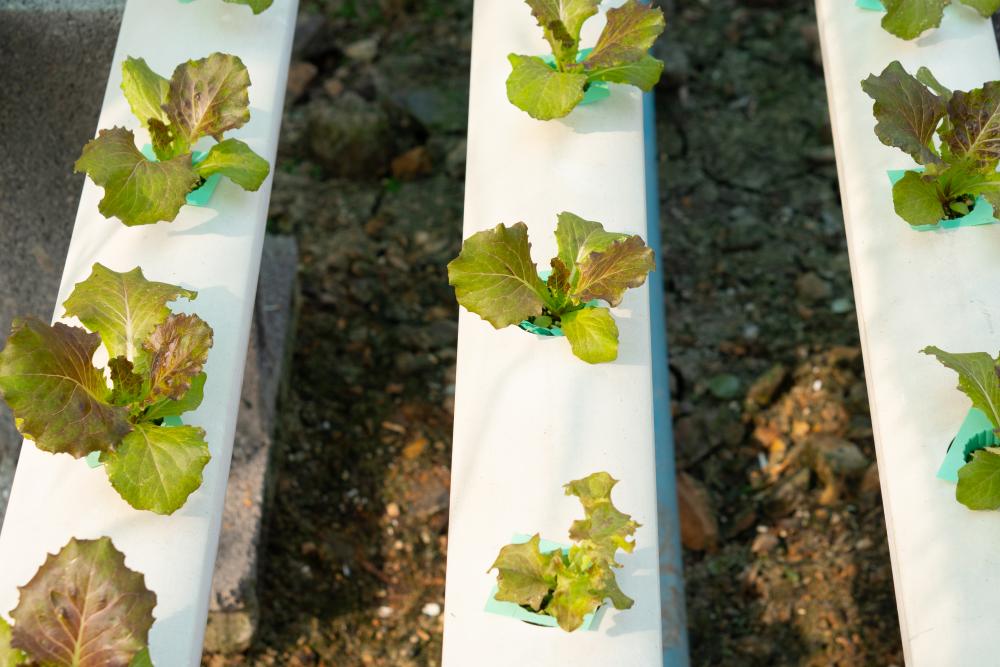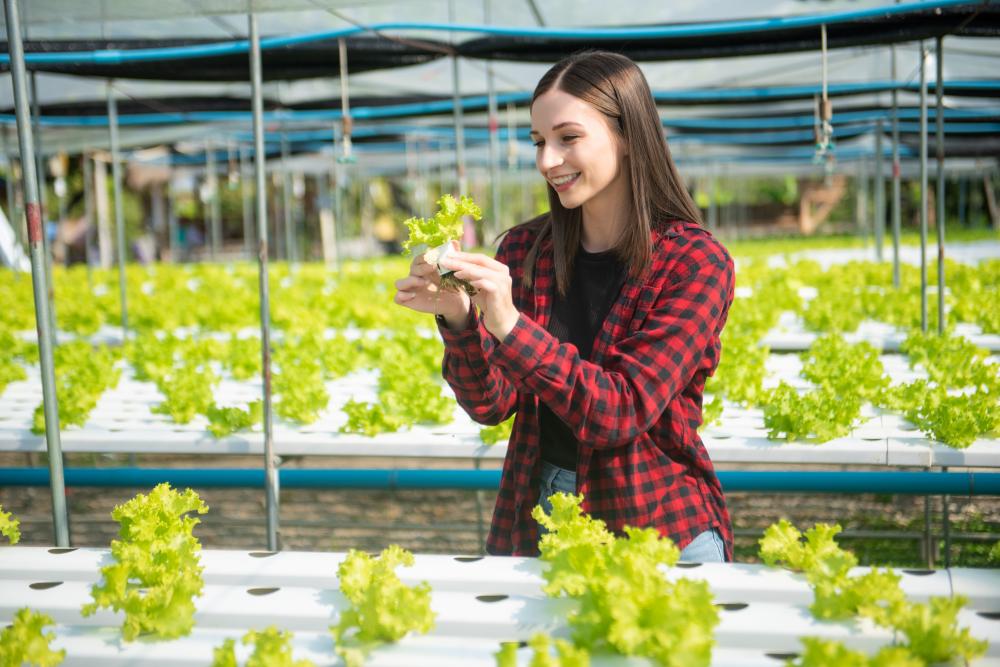
Introduction to Hydroponic Benefits
At RightFit Gardens, we’re on a mission to bring the joy and sustainability of gardening into every home. One method we’re particularly passionate about is hydroponics. This soilless gardening technique has a myriad of benefits that can revolutionize the way we think about growing our food. From saving water to increasing crop yields, the advantages of hydroponics are substantial and worth exploring.
Saving Precious Water
One of the paramount Hydroponic Benefits is water conservation. Traditional gardening methods can consume vast quantities of water, much of which is lost to evaporation and runoff. In contrast, hydroponic systems recycle water directly to the plants’ roots, drastically reducing waste. This efficient use of water is not only good for the environment but also for gardeners looking to minimize their water bills.
Boosting Crop Yields
Space Efficiency
Space is a luxury many urban gardeners don’t have. Hydroponics offers a solution by allowing for vertical farming methods that maximize the use of available space. This way, gardeners can produce more food in smaller areas, making hydroponics an ideal solution for city dwellers and those with limited gardening space.
Faster Growth
Crops grown hydroponically often grow faster than their soil-grown counterparts. This is due to the optimal conditions that can be maintained in a hydroponic system, including ideal nutrient levels, moisture, and light exposure. This means gardeners can enjoy harvesting their crops sooner, allowing for multiple growing cycles within the same year.
Enhancing Food Quality
Hydroponically grown foods not only taste great but can also be more nutritious. By precisely controlling the nutrients in the water, plants can be given exactly what they need to produce rich, flavorful, and nutrient-dense fruits and vegetables. This level of control is difficult to achieve in traditional soil gardening, making hydroponics an appealing option for those looking to optimize their diet.
Reducing Labor and Costs
Another significant advantage of hydroponic gardening is the reduction in labor and costs. Traditional gardening requires tilling, weeding, and pest management, which can be labor-intensive and costly. Hydroponics, on the other hand, eliminates the need for soil preparation and dramatically reduces the occurrence of weeds and soil-borne pests. This not only makes gardening more enjoyable but also more accessible to those who may have physical limitations.
Addressing Environmental Concerns
Hydroponics offers a sustainable alternative to traditional farming methods, which often involve the use of pesticides and herbicides that can harm the environment. By controlling pests through physical barriers and natural methods, hydroponics reduces the need for chemical inputs. This not only protects our planet but also results in cleaner, healthier produce for consumers.
Overcoming Geographical Limitations
One of the most exciting Hydroponic Benefits is the ability to grow food in places where traditional agriculture would be impossible or impractical. From arid deserts to the cold tundra, hydroponics can provide fresh produce year-round, regardless of climate. This could revolutionize food production in areas facing harsh conditions or food scarcity.
Fostering a Community of Gardeners
At RightFit Gardens, we believe that gardening should be a communal activity that brings people together. Through our commitment to hydroponics and education, we aim to foster a community of like-minded individuals passionate about sustainable gardening practices. Whether you’re a seasoned gardener or just starting, we’re here to support your journey.
Hydroponics is more than just a method of gardening; it’s a way to connect with nature, conserve our planet’s resources, and take control of our food supply. The benefits of hydroponics are vast and varied, offering something for everyone–from environmental conservationists to urban foodies.
The Hydroponic Benefits are clear: water conservation, enhanced food quality, space efficiency, and the ability to overcome geographical limitations, to name just a few. As we continue to face global challenges such as water scarcity, climate change, and food insecurity, hydroponics stands out as a sustainable solution. We at RightFit Gardens are excited to be part of this green revolution, sharing knowledge and inspiring a new generation of gardeners to explore the wonders of hydroponic gardening.
Join us as we embark on this journey towards a healthier, happier, and more sustainable world. Together, we can make a difference–one hydroponic garden at a time.

What are the benefits advantages of hydroponics?
At RightFit Gardens, we often highlight the transformative power of hydroponics in modern gardening. The core benefits include water conservation, since systems recycle water directly to the roots, leading to less waste. This is not only eco-friendly but also cost-effective. Space efficiency is another significant advantage; vertical farming techniques enable city dwellers and those with limited space to enjoy gardening and produce more food per square foot. Moreover, hydroponics accelerates plant growth by maintaining ideal conditions, which means you can enjoy your harvest sooner and even increase the number of growing cycles annually. Additionally, the precise control over nutrients enhances food quality, making crops more nutritious and tasty. Lastly, hydroponics reduces labor and costs associated with traditional soil gardening by eliminating the need for tilling, weeding, and dealing with soil-borne pests. These combined benefits make hydroponics a compelling method for sustainable, efficient, and productive gardening.
Is hydroponics good for health?
Absolutely! Beyond the environmental and efficiency benefits, hydroponics plays a significant role in promoting healthier eating habits. By giving plants precisely what they need to grow, hydroponic systems can produce fruits and vegetables that are often richer in nutrients and free from soil-borne pests and diseases that can affect plant health. This means the produce is cleaner and possibly safer to consume. For individuals and communities with limited access to fresh, healthy foods, hydroponics offers a way to secure a supply of nutritious produce year-round. It’s a step towards food sovereignty and wellness, ensuring that regardless of where you live or what time of year it is, you have access to food that supports a healthy lifestyle.
What are the pros and cons of hydroponics?
Hydroponics boasts several advantages, such as conserving water, increasing space efficiency, enhancing food quality, and reducing labor and maintenance costs. However, like any method, it has its drawbacks. The initial setup for a hydroponic system can be more expensive than traditional gardening due to the need for equipment like pumps, grow lights, and nutrient solutions. There’s also a learning curve; successful hydroponic gardening requires understanding the basics of plant nutrition and system maintenance. Moreover, hydroponic systems rely on electricity, making them vulnerable to power outages. Lastly, because plants grown hydroponically can be more sensitive to environmental changes, issues like nutrient imbalances or water pH discrepancies can have rapid and sometimes devastating effects if not promptly addressed. Despite these challenges, many gardeners find the benefits far outweigh the cons, especially with the growing availability of resources and community support to navigate the learning process.
Who benefits from hydroponic farming?
Hydroponic farming holds promise for a wide range of individuals and groups. Urban dwellers, who often have limited space, can greatly benefit from the space efficiency of hydroponic systems. Moreover, it offers a viable solution for producing fresh produce in areas with poor soil quality or harsh climates, making it ideal for communities in food deserts or regions facing agricultural challenges. Hydroponics also presents an opportunity for schools and educational programs to teach children about science and nutrition, promoting healthier eating habits from a young age. Additionally, entrepreneurs and commercial growers can take advantage of hydroponics’ higher yields and faster growth rates to run profitable businesses. Lastly, individuals with physical limitations find hydroponics more accessible due to the reduced need for weeding and soil management. Essentially, anyone interested in sustainability, self-sufficiency, education, or just fresh, healthy food stands to benefit from exploring hydroponic farming.
Can hydroponics save water in large-scale agriculture?
One of the most compelling arguments for hydroponics is its ability to significantly reduce water usage, a crucial consideration in today’s agricultural landscape where water scarcity is an increasing concern. In large-scale agriculture, adopting hydroponic systems can lead to substantial water savings, as these systems recycle water directly to the plants’ roots, minimizing evaporation and runoff. Studies have shown that hydroponics can use up to 90% less water compared to traditional soil farming methods. This makes it an attractive option for regions facing water scarcity issues. Additionally, by allowing for precise control over water and nutrient delivery, hydroponics can also contribute to reducing the overuse of fertilizers, further protecting water resources. While the initial investment and the need for technical expertise can be barriers, the long-term benefits of water conservation and potentially higher yields present a compelling case for integrating hydroponics into large-scale agricultural practices.
How does hydroponics impact the environment?
Hydroponics represents a green and sustainable approach to agriculture. By circumventing the need for arable land, it prevents soil degradation and loss of fertile land due to overuse and erosion. Additionally, since hydroponic systems recycle water, they significantly reduce water usage and waste. This is especially crucial in areas susceptible to drought and water scarcity. Furthermore, because hydroponic farms can be set up near urban centers, they decrease the distance food needs to travel from farm to consumer, reducing carbon emissions associated with transportation. While hydroponics does rely on electricity, which can be a drawback, the integration of renewable energy sources can mitigate its environmental impact, making it a highly sustainable way to produce food. Moreover, by minimizing the use of pesticides and herbicides, hydroponics contributes to lessening the load of chemical pollutants in our waterways and ecosystems. Therefore, when implemented thoughtfully, hydroponics can have a positive environmental impact, aligning with broader goals of sustainability and ecological preservation.
Can hydroponic systems be cost-effective for home gardeners?
Initially, setting up a hydroponic garden may seem expensive due to the cost of equipment and supplies. However, when considering the long-term benefits, hydroponics can indeed be cost-effective for home gardeners. The efficiency of water and nutrient use, combined with potentially higher yields and faster growth rates, means that gardeners can produce more food in less space and time. Over time, savings on water bills, the cost of fresh produce, and the reduction in food waste can offset the initial investment. Additionally, the market for hydroponic systems and supplies has grown, making it easier to find affordable and user-friendly options suitable for a range of budgets and spaces. For those willing to DIY, there are countless resources available to build cost-effective systems using common household materials. Ultimately, with some research and initial investment, hydroponics can be a highly rewarding and economically viable gardening method for enthusiasts at all levels.
Hydroponic Resources
- United States Department of Agriculture (USDA) – The USDA provides information on sustainable agriculture practices, including hydroponics, to promote food security and environmental health.
- University of Minnesota Extension – The University of Minnesota Extension offers resources on hydroponic gardening, crop production, and sustainable farming techniques.
- U.S. Food and Drug Administration (FDA) – The FDA’s website provides guidelines on food safety and regulation, including information on hydroponic food production.
- Environmental Protection Agency (EPA) – The EPA offers resources on water conservation, environmental protection, and sustainable agricultural practices, including hydroponics.
- National Institute of Food and Agriculture (NIFA) – NIFA funds research and education projects related to agriculture, including hydroponic farming techniques and technologies.

